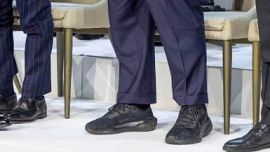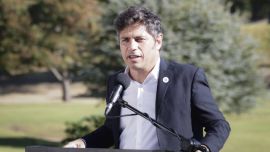It’s a curious thing how Argentina manages to invite itself to the ‘big boys’ table’ just as things are about to get hairy. Minutes before he jetted off to Kiev in the midst of a worrying military escalation on the border between Russia and Ukraine, US Secretary of State Antony Blinken sat down with Argentina’s recently reformatted Foreign Minister, Santiago Cafiero to discuss “our countries’ many shared interests,”congratulating Argentina for being elected President of United Nations Human Rights Council while looking “forward to our work to promote democracy and human rights in the hemisphere.” Cafiero, on Twitter, noted the bilateral relationship is still being built on the basis of “frank and fluid dialogue with the United States,” adding they spoke about President Alberto Fernández’s “path of recovery and sustainable growth.”
Just as US President Joe Biden’s gaffe during his first press conference a year into office mistakenly gave Russian Premier Vladimir Putin a window of opportunity for a small incursion of Russian forces over the Ukrainian border, Alberto Fernández is now getting ready to go on his own overseas excursion. In just a few weeks, Fernández will make his way to Moscow to meet Putin to also discuss the “bilateral relationship,” according to state news agency Telam, before hopping over to Beijing to see Xi Jinping and the inauguration of the Winter Olympics. Biden, of course, has called for a diplomatic boycott of the games because of “egregious human rights abuses and atrocities in Xinjiang,” according to White House Press Secretary Jen Psaki. Thus, Alberto will be having tête-à-têtes with the United States’ two major geopolitical adversaries not long after his Foreign Minister met Blinken. The world may already be at war by then.
In tandem, a Project Syndicate column written by Nobel laureate Joseph Stiglitz titled “Argentina’s COVID Miracle,” sparked fierce domestic debate regarding the issue of the debt, and of course the country’s economic performance. The prize-winner is none other than Economy Minister Martín Guzmán’s mentor, having brought him onto his team at Columbia University from where he catapulted to the Fernández-Fernández administration for his views on sovereign debt negotiations. In his column, the economist – who is one of Cristina Fernández de Kirchner’s favourites – underscored the strength of the economic recovery, with output rebounding 10 percent, despite Argentina’s tough constraints on expansionary fiscal policy. Of course, Sitglitz was throwing a bone to his friend Guzmán, who is in the midst of tough negotiations with the International Monetary Fund, while throwing darts at those suggesting the US should engage in contractionary economic policies as inflation reaches its highest levels since the 1980s. Interestingly, it’s none other than Janet Yellen who is in charge at the Department of the Treasury and who is in control of the economic levers of the US these days, a close friend of Stiglitz.
Yellen is also the person Guzmán must seduce in order to unlock debt negotiations with the IMF, along with advisor David Lipton, who not too long ago was in charge of the Fund’s negotiations with a certain Mauricio Macri. Alas, we’ve managed to come full circle! As the US and its allies are on the verge of a war with Russia and Putin flexes to show strength in his coveted sphere of influence, Argentina is trying to cosy up with both Biden and Moscow in order to gain support for debt negotiations with the IMF and to secure investments. At the same time Alberto Fernández et. al. are seeking to consolidate a relationship with China, just as Xi is looking to position his nation through hard and soft power as a major global player. At play are not only investments in Argentina, but also support for the standoff with the Fund’s negotiators, as China is one of IMF’s largest shareholders.
All of this, of course, as Argentina continues a hybrid foreign policy in which support for anti-US regimes like Cuba, Venezuela, and Nicaragua combine with a shared interest with Washington in seeing Iran’s Vice-President for Economic Affairs Mohsen Rezai detained after a shotgun trip to South America. It isn’t entirely clear how, for example, internal divisions in the ruling coalition, Frente de Todos, are being read by the different geopolitical actors. Vice-president Cristina, as is her custom, penned a short-but-sweet letter lambasting the IMF once again. Her sector within the Frente de Todos is the most aligned with anti-democratic regimes in conflict with the US. And Guzmán, who is thought to be the rational actor, recently made comments noting the Fund would suffer a “loss of legitimacy if it pushes Argentina into a destabilising situation.”
Stuck in this hot mess, it is difficult to figure out Argentina’s strategy as the clock of default keeps ticking. An impossible debt calendar is around the corner and Guzmán’s negotiations seem to have ground to a halt. While Stiglitz’s protégé keeps his cards close to the vest, it’s not clear whether Cristina and/or Alberto are willing to tolerate a potential default. Equally as difficult to figure out is the position of the opposition, banded together under the Juntos banner. After a powerful electoral victory in the midterms, infighting and positioning ahead of 2023 seems to have sucked the air out of them. Fortunately (for them), the government continues to trip on the same rock(s). The official messenger is quickly becoming former Buenos Aires Province governor and national deputy María Eugenia Vidal, who on Twitter tried to debunk the “myth” that Macri’s government recklessly took on debt. City Mayor Horacio Rodríguez Larreta is excessively media trained to the point where, beyond obvious generalities and attacks on the government, it isn’t clear what plan he is proposing. And within the Civic Radical Union an emboldened Gerardo Morales (Governor of Jujuy Province) has taken the presidency of the party and is calling on Juntos to own up the debt problem. Many are accusing him of dancing to the tune of Sergio Massa. Without a clear message, and a way to support some sort of deal with the IMF, it doesn’t feel like the opposition is helping much anyway.


















Comments